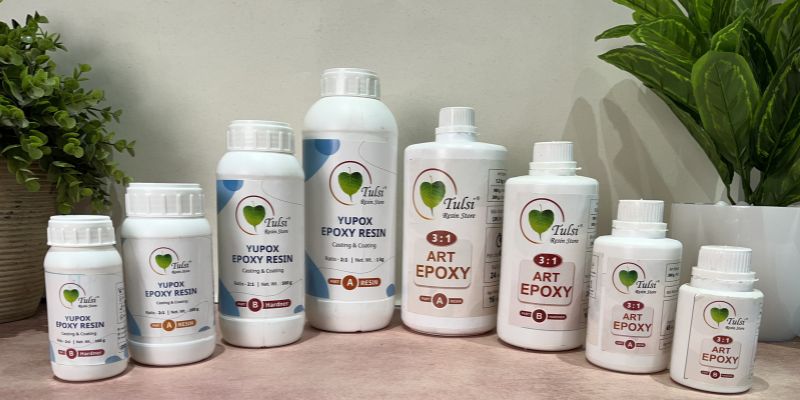Dipping your toes into the world of resin art can feel like entering a candy store—exciting, but also overwhelming! With so many types of resin available, choosing the right one can feel like a daunting task. Each resin has its own personality, quirks, and best-use scenarios. To make your resin journey smooth and enjoyable, let’s break down the types of resin along with their pros and cons, so you can choose wisely before your next project.
Different Types of Resin
1. Epoxy Resin: The Star of DIY Projects

Epoxy resin is like the versatile friend who’s good at almost everything. It’s the most popular choice for artists and DIY enthusiasts because of its ease of use and stunning finish.
Pros:
-
Crystal-clear finish: Perfect for projects where clarity and gloss are essential, like coasters or jewellery.
-
Beginner-friendly: It’s easy to mix and has a forgiving cure time.
-
Durable and long-lasting: Great for items that need to withstand daily wear and tear.
-
Low odor: Makes it ideal for indoor use.
Cons:
-
Sensitive to UV light: Prolonged exposure can cause yellowing over time.
-
Not heat-resistant: Avoid using it for items like trivets or anything that will be exposed to high temperatures.
2. Polyester Resin: The Budget-Friendly Choice
If you’re looking for a resin that’s both affordable and strong, polyester resin might be your match. Commonly used in industrial applications, it’s a sturdy option for specific craft projects too.
Pros:
-
Cost-effective: Perfect for larger projects on a budget.
-
Highly durable: Excellent for structural applications like outdoor decor.
-
Quick curing: Saves time when you’re in a hurry.
Cons:
-
Strong odor: You’ll definitely need a well-ventilated workspace.
-
Less clear finish: Not the best option for art pieces that demand clarity.
-
Brittle when cured: It’s more prone to cracking under pressure.
This resin works well for non-decorative items, but keep its limitations in mind if you’re going for that Pinterest-worthy aesthetic.
3. UV Resin: The Quick Fix
UV resin is the sprinter in the resin family. It cures instantly under a UV lamp, making it ideal for small and intricate projects.
Pros:
-
Fast curing: No waiting around for hours; cures within minutes under UV light.
-
Ideal for small crafts: Perfect for quick fixes, jewelry, or embellishments.
-
Crystal-clear finish: Makes your projects sparkle.
Cons:
-
Requires UV light: You’ll need to invest in a UV lamp or rely on strong sunlight.
-
Not ideal for large projects: Curing can be uneven for bigger surfaces.
-
Less durable: Not as robust as epoxy resin for high-usage items.
4. Casting Resin: The Deep Pour Specialist
Casting resin is designed for those mesmerizing deep-pour projects. Think river tables, large sculptures, or anything that requires volume.
Pros:
-
Perfect for deep pours: Handles up to several inches of depth in one go.
-
Minimal shrinkage: Ensures consistency in large-scale projects.
-
Crystal-clear finish: Delivers a flawless look for high-impact designs.
Cons:
-
Slow curing: Patience is key; it can take days to fully cure.
-
Requires careful mixing: Even slight errors can affect the final result.
-
Heat generation: Large pours can overheat if not handled correctly.
5. Art Resin: The Artist’s Favorite
Specifically designed for artists, art resin offers the perfect combination of clarity, safety, and ease of use.
Pros:
-
Non-toxic: Safer for artists working indoors for extended periods.
-
UV-resistant: Retains its clarity over time.
-
Self-leveling: Ensures a smooth, glass-like finish every time.
Cons:
-
Premium pricing: Slightly more expensive than regular epoxy resin.
-
Limited availability: Not as widely stocked as other resin types.
Picking the Right Resin: Tips and Tricks
Now that you know the strengths and quirks of each type, here’s how to choose the right resin for your project:
-
For beginners: Start with epoxy resin for its versatility and ease of use.
-
For small, quick projects: Go for UV resin to save time.
-
For large, functional projects: Opt for casting resin or polyester resin.
-
For professional art: Art resin is your go-to choice.
Final Thoughts: A World of Possibilities
Understanding the types of resin is your first step toward crafting pieces that truly stand out. Whether you’re creating elegant jewelry, a statement wall clock, or a river table that steals the show, the right resin makes all the difference. Take your time to explore, experiment, and most importantly, have fun with the process.
Ready to start your resin adventure? Discover top-quality resins and tools at Tulsi Resin Store. Your masterpiece is just a pour away!


What is Resin Art and Why It's the Latest Trend in Home Decor?
A Guide to Resin Uses in Crafting: Tips for Beginners and Experts